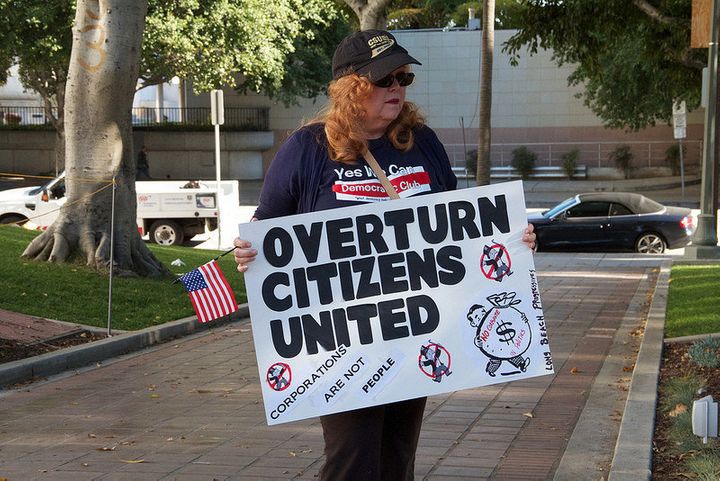Kathleen Miles is the executive editor and cofounder of Noema Magazine. She can be reached on Twitter at @mileskathleen.
California voters are poised to become the largest electorate to decide whether to support a constitutional amendment that would overturn the U.S. Supreme Court’s Citizens United ruling.
California Assemblymember Bob Wieckowski (D-Fremont) introduced a bill, AB 644, Wednesday to put a measure on the state’s 2014 ballot urging Congress to pass a constitutional amendment to overturn the 2010 Citizens United ruling, which lifted restrictions on political spending by corporations and labor unions. Independent spending in federal elections has exploded since the ruling.
“It’s one thing for a legislator to say he wants this,” Wieckowski said. “It’s another thing for Congress to have direct instruction from the voters. There comes a tipping point where people are upset with billionaires having a disproportionate impact on our electoral system.”
The measure is backed by campaign finance watchdog Common Cause. The group’s growing effort includes ballot questions that allow voters in cities and states to weigh in on Citizens United.
“Giving the voters of the most populous state, the world’s ninth-largest economy, the chance to declare that Citizens United should be reversed would be historic and the momentum this reform movement needs to sweep the nation,” said Phillip Ung, policy advocate for Common Cause. “As goes California, so goes the nation.”
Hearing directly from voters, Wieckowski said, will force more local politicians to get behind campaign finance reform. “For example, if a Republican legislator in Orange County saw 60 percent of his district vote to overturn Citizens United, he’ll realize, ‘Oh my God, that’s empirical evidence,’” Wieckowski said.
Last November, voters in Montana, Colorado and 175 cities, including Chicago, San Francisco, and more than half the cities in Massachusetts, passed measures instructing Congress to support a constitutional amendment to overturn Citizens United.
The ballot measures all passed, winning from 72 percent to 81 percent of the vote. Even in the red state of Montana, where 55 percent of the presidential election vote went to Republican Mitt Romney, 75 percent voted in favor of a constitutional amendment to overturn the court’s ruling.
This grassroots approach aims to do what legislators have so far failed to deliver. Over the past two years, 17 bills to pass a constitutional amendment to overturn Citizens United have been proposed by members of Congress, but none made it to the floor for a vote.
An 18th bill has been proposed. Rep. Adam Schiff (D-Burbank) recently introduced a constitutional amendment to overturn Citizens United and to allow public financing in states.
Schiff, a Democrat and former member of the conservative Blue Dog coalition, admitted it’s an uphill battle, but said he hopes to build bipartisan support for the bill. “Resistance will be strong, but so will support,” Schiff said. “Many of my colleagues, both Republicans and Democrats, witnessed an outpouring of spending by outside groups in this past election. Super PAC spending will increasingly target candidates of both parties, and I expect bipartisan support will grow at the same time.”
Adam Winkler, a law professor at UCLA and expert on constitutional law, said Schiff’s proposal is merely one step toward a distant goal.
“No constitutional amendment is going to be passed in the near future. You have to play a long game when it comes to the Constitution,” Winkler said. He said he believes it will take both city and state popular votes as well as legislative proposals like Schiff’s to build pressure for a constitutional amendment.
“The constitutional amendment process is like a baseball game — easy to get frustrated that there’s no winner by the end of the first inning,” Winkler continued. “But you’re actually seeing just as much activity today as you saw a year or two ago to get the amendment added.”
Winkler pointed to women’s suffrage as an example of how long it takes to amend the Constitution. Women’s suffrage first gained traction in 1848. It wasn’t until 1919 — 71 years later — when women were given the right to vote with the 19th Amendment.
Schiff acknowledged that federal legislation needs backing from state and local votes. “The process of amending the Constitution is long and difficult, just as the framers intended, but I believe that as more Americans see the impact of enormous and anonymous spending on our electoral system, pressure will build to bring a constitutional amendment up for debate,” Schiff said.
Voters also should make electoral decisions based on candidates’ stances on campaign finance, said David Burke, civil litigation attorney who has worked with the Money Out/Voters In Coalition in LA.
“Regardless of the outcome on any given bill or vote or proposal, what’s important is getting this issue into the public’s consciousness,” Burke said.
“I think we’ll start to see changes if we focus on this in 2014 election cycle,” Burke said. “If we demand to know where our elected officials stand on these issues before electing them, we will see progress begin to take place.”





